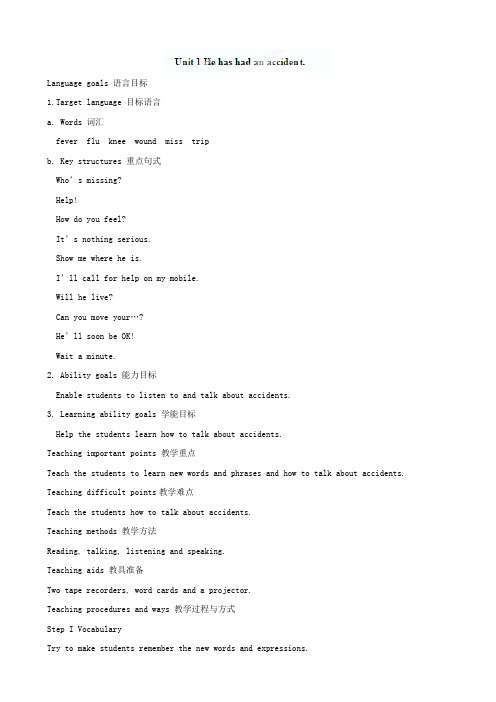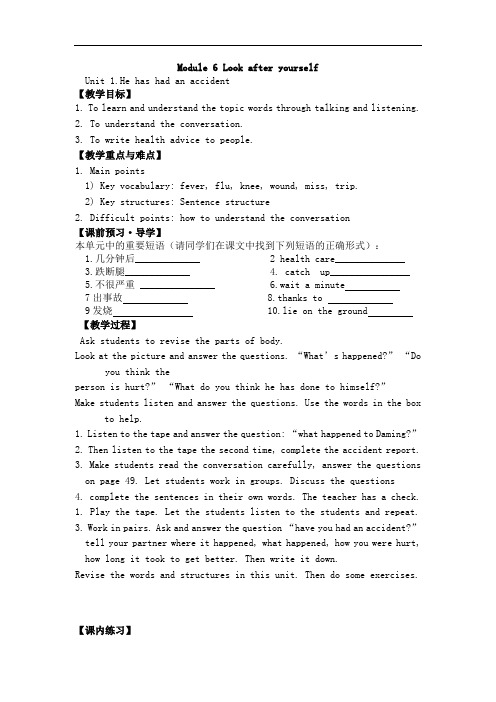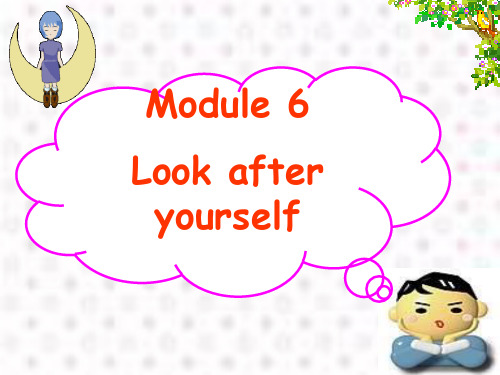Unit 1 He has had an accident 学案2(外研版九年级下)
- 格式:doc
- 大小:126.00 KB
- 文档页数:9

外研版英语九下Module 1:Unit 2学案【表格式】
学前活动:
I.主动学习,提高能力:你的例句:(可以背书上原句)梦想着去首都
他的第一次(乘火车)旅行
(在)他的新生活的开始
16年来
紧紧地抱住某人
眼含热泪
朝窗外看
带着尴尬的微笑
饶有兴致地观望
大声地/坚定地/轻柔地说
一个戴着眼镜的男人
正好那个座位的票
消失在车厢心头
II. 合作互议,解决问题
语词类:短语多多:
get off/ take off/ s ee … off/ turn off/ set off/ show off/ fall off/ have one day off
2. be able/unable to
语法类:
伴随状语的几种情况:(试举例)
短语:
without 短语:
3.名词小测验:(见附页)
语用类:
Make some traveling suggestions about the season, the time of day, the number of seats,booking tickets…?
III.应用所学,检测成败:
翻译句子:
1.那个年轻人正好有那个座位的票。
2.这是他第一次坐火车远行,离开他16年的村庄和家乡开始他新的生活。
3.其他人饶有兴致地观望着。
4.最后一个戴着眼镜的人大声地说。
5.我将在你之前下车,然后你可以坐我的座位。
走进生活:。

外研版九年级英语说课稿He has had an accident说
课稿
Hehashadanaccident说课稿
尊敬的各位评委:
大家好!我说课的题目是《Hehashadanaccident》,选自外研版中学九年级下学期第六模块第一单元.
一、教材分析
1、教材的地位和作用:
本模块是九年级英语中重要的一模块,它围绕着“健康生活”这一主题开展多种教学活动,例如词汇,句子,语篇等。
本课内容是涉及“出行安全”、“生活习惯”、“饮食健康”、“充足睡眠”、“乐观心态”和“远离香烟和毒品”等,语言技能和语言知识都是依据中心话题展开的。
在学生已有的英语知识的基础上进一步巩固旧知识,学习新知识。
本课除了进一步提高学生的听、说、读、写的综合素质能力,更重要的是培养学生发散思维、团结协作和社会实践的能力。
所以本课承上启下,至关重要。
2、教学目标的确定:
(1)《英语课程标准》中对九年级学生在语言技能、语言知识、情感态度、学习策略和文化意识五个方面的目标是这样描述:对英语学习表现出积极性和初步的自信心;能听懂有关熟悉话题的语段和间断的故事;能与教师或同学就熟悉的话题交换信息;在交际活动中要做到语音、语调基本正确、自然、流畅;能参与简单的角。

Language goals 语言目标1.Target language 目标语言a. Words 词汇fever flu knee wound miss tripb. Key structures 重点句式Who’s missing?Help!How do you feel?It’s nothing serious.Show me where he is.I’ll call for help on my mobile.Will he live?Can you m ove your…?He’ll soon be OK!Wait a minute.2. Ability goals 能力目标Enable students to listen to and talk about accidents.3. Learning ability goals 学能目标Help the students learn how to talk about accidents.Teaching important points 教学重点Teach the students to learn new words and phrases and how to talk about accidents. Teaching difficult points教学难点Teach the students how to talk about accidents.Teaching methods 教学方法Reading, talking, listening and speaking.Teaching aids 教具准备Two tape recorders, word cards and a projector.Teaching procedures and ways 教学过程与方式Step I VocabularyTry to make students remember the new words and expressions.Ask students to read the new words after the teacher. After making sure that all the students can read them correctly, give them 5 or more minutes to learn the words by heart. Then ask the students to dictate in pairs.The teacher can play card games with students to help them remember the new words. The teacher can prepare some cards with English words on one side and their Chinese meanings on the other side. Then randomly picks out one card for students to say the English words or their Chinese meaning.Step II TalkingAsk students to look at the picture on Page 48, and talk about questions in Activity 1 in pairs. Encourage the students to try to use the new vocabulary. Before the students talking about this picture, the teacher can introduce some useful expressions for the students to refer to.T: What can you see in the picture?S: I can see some people.T: What’s happened to the boy? Do you think he has h ad flu or a fever? (Speak slowly and stress have flu and a fever. If necessary, repeat the sentence again.)S: Maybe.T: Why? What you should do when you have to give first aid.Step III ListeningGet student to do Activity 2. When it is very urgent, we should keep…Next, we’ll listen to a dialogue about a serious accident. Fist, look through thequestions in Activity 2 and guess what has happened.Play the recorder twice for the students. Then ask them to answer the questions.Step IV ReadingGet students to read and listen to the dialogue in Activity 3 and complete Activities 4, 5, 6. Help the students learn how to talk about accidents.ListeningGet the students to listen to the dialogue. Then finish the accident report in Activity 4. Sample answers:SummarizingGet students to read the dialogue again and help them summarize ways of talking about accident. Show the sentencesActivity 5 Ask the students to read the dialogue again and answer the questions.Sample answers:1. Because it is cloudy and going to rain.2. He left Daming lying on the ground.3. About 10 minutes ago.4. To check whether he can walk or not.Activity 6 Ask the students to complete the sentences.Sample answers:1. Mr. Jackson and Betty have to wait for Tony and Daming because they walked more slowly andhave left far behind.2. As soon as Mr. Jackson decided to look for them, Betty heard someone calling help.3. The reason why Daming had an accident is that he was running along the wall when he trippedand fell over the edge.4. Although Daming can’t walk, he will live.5. Daming has got a wound in his leg. However, Mr. Jackson said he would soon be OK!Step V PronunciationGet students to do Activities 7-8. listen to the sentences in Activity 7.Help students have a basic idea of sense group. Play the tape and get them to listen to and repeat after the tape. Then do Activity 8 for practicing.Step VI SpeakingAsk students talk about an accident in pairs. First help them summarize the related expressions for talking about an accident.1. Expressions about how someone was hurta. He’s cut his head, his shoulder hurts and I think he broken his leg.b. I cut my face, and hurt my arms and knees.c. He’s got a wound in his leg and he may get a fever but it’s nothing serious.2. Expressions about how long it took to get bettera. It took him … to get better.b. It was three weeks before I could ride my bike again.Then ask them to make their dialogues in pairs. Later ask some pairs to act their dialogues out. Step VIII Homework1. Ask the students to work in pairs to review what they have learned today.2. Ask students to preview Unit 2 and mark where they don’t understand.3. Ask students to interview some doctors or surf on the internet to collect health advice topeople.。

Module 6 Look after yourselfUnit 1.He has had an accident【教学目标】1. To learn and understand the topic words through talking and listening.2. To understand the conversation.3. To write health advice to people.【教学重点与难点】1. Main points1) Key vocabulary: fever, flu, knee, wound, miss, trip.2) Key structures: Sentence structure2. Difficult points: how to understand the conversation【课前预习·导学】本单元中的重要短语(请同学们在课文中找到下列短语的正确形式):1.几分钟后_____________ 2 health care______________3.跌断腿_____________4. catch up________________5.不很严重 _______________6.wait a minute7出事故 8.thanks to9发烧 10.lie on the ground 【教学过程】Ask students to revise the parts of body.Look at the picture and answer the questions. “What’s happened?” “Do you think theperson is hurt?” “What do you think he has done to himself?”Make students listen and answer the questions. Use the words in the box to help.1. List en to the tape and answer the question: “what happened to Daming?”2. Then listen to the tape the second time, complete the accident report.3. Make students read the conversation carefully, answer the questions on page 49. Let students work in groups. Discuss the questions4. complete the sentences in their own words. The teacher has a check.1. Play the tape. Let the students listen to the students and repeat.3. Work in pairs. Ask and answer the question “have you had an accident?” tell your partner where it happened, what happened, how you were hurt, how long it took to get better. Then write it down.Revise the words and structures in this unit. Then do some exercises. 【课内练习】一、用括号中的词语的适当形式填空:(be used for/ as/ by)1. English ________ travelers all over the world.2. The calculators ________ working out math problems.3. The radio ______ a tool in my English study.(pleased ;pleasant)4. He was _____ to see his best friend in the street.5. He has never forgotten the _____ trip in the mountains.(by mistake;by accident)6. Luckily,I found my lost keys _______.7. I’m sorry. I took your book _______.(in a way;in this way;in the way)8. The traffic is busy, you shouldn’t be ______.9. _____ he was sorry about the thing.10. ______ you can work out the math problem easily.【课内拓展】二、根据汉语完成句子1. 他正沿着城墙走,一下绊倒了跌倒在边上。


Module 1 Unit 2 学案The Grand Canyon was not just big学习目标:知识目标:能够熟记本模块词汇。
能力目标:能够读懂短文,并能够写出与自然景观有关的作文。
情感目标:通过学习,培养我们热爱大自然的高尚情趣。
学习重难点:能够熟练运用六种时态学习步骤:Step1:课前读词并默出单词:(7’)1灰色__________ 2地面___________ 3在...下面___________4照耀___________ 5底部____________ 6峡谷___________7边面侧____________ 8 在... 旁边___________ 9 回答_______________ 10标志___________ 11散开清晰的___________ 12 升起________________ 13银色___________ 14河流_______ 15巨大的_____________16逗留_______________Step2: Talk about the wonders (5’)1.Mt. Qomolangma 、the Grand Canyon 、the Great Barrier Reef are _________ wonders.2.The Pyramids of Egypt、the Stonehenge in England、the Terracotta ArmyAre they natural wonders?Are they modern wonders?3.Bird’s Nest、the Sydney Opera House、the Empire State BuildingThey are ________ ___________ wonders.Step3:( 20’)(一)Fast readingRead and match the paragraph with the main meaning.Para1 Who when weather how wherePara2 Something happened on the way therePara3 First impression of the Grand CanyonPara4 some detailed description of the Grand CanyonPara5 The feeling of the writer(二)Careful readingRead Para1-2 then finish1)when:_________________2)weather:it_________, the sky_________.3)How :I ________, _______and_________.4)On the way, a stranger ______ beside the path. He knew where I_____. Finally, I came to some rocks and _____ them.1.周围什么也看不到,但我知道就在那里。
Module 1 Wonders of the world 学案Unit 2 .The Grand Canyon was not just big. (I I)I.课前预习:短语互译1. 从……上方看过去look __________2. 突然向下倾斜fall __________3. 向下看look________4. 在……底部__________ the __________ of5. get out of ______________6. on top of ______________根据汉语完成句子1. He knew ______ ______ ________ _________.他知道我要去哪里2._____ ______ there _______five minutes.五分钟后你将到达那里。
3.I______ ______ _______the Colorado River, a silver stream nearly one mile below me.我俯视着在我下面差不多一英里的一条银灰色小河----科罗拉多河。
4. Then I looked across to ______ _________ ________the canyon.然后,我眺望峡谷的另一边。
5.It was about fifteen miles ______, ______ ______.它大约15英里远,也许更远。
nguage points:1. reply v. 回答; 答复,接宾语时它常常和to 连用,相当于answer【语境领悟】“Yes, ”he replied, “you’ll get there in five minutes. ”“是的, ”他回答, “五分钟以后你就可以到那儿。
”We answered his letter yesterday. (同义句转换)We __________ ___________ his letter yesterday.昨天, 我们给他回了信。
九年级英语He has had an accident教案Unit 1 He has had an accident.一. 教学内容:Module 6 Look after yourself二. 重难点讲解:Unit 1 He has had an accident.Betty: Hey! My legs are aching. How far have we walked? </o:g adj. 失踪的,下落不明的;在句中作表语/ 定语Betty: Tony and Daming. What’s them?物做主语 What happened to your cell phone?人做主语 I haw his cellumber.Lingling: They were walking more slowly than us. them. look at/ see/ watch/ visit/ read/look afterlook likelamelook for/ findlook outlook overlook upBetty: Wait a minute! I can heaTony: Help!Lingling: It’s Tony. Where have you been?Tony: It’s Daming. He has had an accident. He was running along the wall when he helbile.call foreg. The policeman met a girl calling for heleg. The UN is calling for a cease-ddle-East.eg. Tblems calldiate solution.Tony: lyingground!完全倒装:主语是名词 Hbus.部分倒装:主语是代词 Here we are.</o:ackson: Hi, Daming. How do you feel?Daming: My leg hurts, and I feel a bit cold. Tony: And you’ve cut youThere’s blood on your leg. and he may get a fever but it’g serious. He’ll soon be OK!get a wound in/leg。
Teaching aims:1、知识目标:(1) 词汇:fever, wound, miss, trip, ache, fall over, catchup, nothing serious, as soon as, on one’s way to(2) 句型: ①What's happened to them?②I think it’s going to rain.③We had better get you to hospital.④He was running along the wall when he tripped andfell over the edge.2、能力目标:能听懂关于意外事故和疾病的英语话题,能以How doyou feel?My leg hurts.或Nothing serious.等展开对话。
3、情感目标:通过学习,掌握一些救生知识,学会自我保护。
Teaching keys;(1)句型:①He was running along the wall when he tripped andfell over the edge.②There he is, lying on the ground!(2)语法:动词的时态Teaching difficulties:动词的时态知识点拨:一.Key words:1.fever n.发烧,常用短语:have\run a (high)fevere.g.The boy _____ _____ _____ _____. 这男孩发高烧。
2. wound n.伤;伤口e.g. The soldier got a serious w_______ on the leg.【用法点拨】wound一般指外伤,多指刀伤或枪伤。
其形容词为wounded “受伤的”。
e.g. The w______ boy was sent to the hospital.【联想辐射】wound v.伤害;损害e.g.The teacher’s words w________ him badly.3.miss v.不在e.g. When I visited her, she was m_______.【联想辐射】(1)be missing失踪的;下落不明的。
missing为形容词。
其同义短语为be loste.g.It’s said that the old man is m_______\ l____.(2)miss v.想念;怀念e.g.She says that she m_____ you very much.(3) miss v.错过e.g.He m_____ the early bus.4. trip v.绊;绊倒,常与over连用e.g. She _______ ______ the stone and fell.5. catch up 赶上,常与介词with连用,catch up with意为“赶上……”e.g. He is running in order to ______ ___________ us.6. happen to sb. 发生在某人身上【辨析】happen与take place两者都有“发生”之意。
happen指偶然发生,take place 含有未经筹划之意;是指按计划或预想发生,并非出于偶然。
e.g.(1)The accident ________ on a cold evening.(2)Great changes have _________ in my hometown in thepast 20 years.二.Key sentences :1.He was running along the wall when he tripped and fell over the edge.【结构分析】这是一句由when引导的时间状语从句,强调主从句动作发生的先后顺序,表示“正当一个动作正在进行的时候,另一个动作发生了”,多用于过去时态。
【注意】一般主句为进行时,从句用一般过去时。
e.g. We __________(talk) about the accident whne thephone rang.2.There he is, lying on the ground!(1)在本句中There he is属于倒装句,多用于口语,用于引起对某人某事的注意。
e.g. Here comes the bus!(2) lying on the ground是现在分词短语作伴随状语。
e.g.She sits under the tree, ______(eat) an apple.当堂达标一、根据句意和首字母提示完成单词。
1. The nurse cleaned the w_____ before the operation.2. He t______ when he went upstairs this morning.3. Lily didn't go to school because she had a bad f_______.4. The m______ boy was found by the lake yesterday evening.5. When I got home , my mother was on her k______ looking for something under the bed.6. What i______ does he often get? He often catches a cold.7.Lin Tao had an a______ during his trip and cut his face.二、选择填空( ) 1.It seems that it is going to rain , You had better _____ the windows open when you leave the house.A.not leaveB. leaveC.not to leaveD. to leave( ) 2. There, on the ground, _____ an old man in dirty clothes.A. lyingB. liedyid( ) 3.-I really hope to keep in touch with Lucy.-Sorry, I don't know______.A. what her name isB.what her job isC. what her number isD. when she left( ) 4.- Susan stays alone in the classroom and looks sad.-________ to her?A. What happensB. What has happenedC. What is happeningD. What was happening( ) 5. Please write to me as soon as you ____ there tomorrow.A.will getB.getC. will get toD. get to( ) 6. There is ________ in today's newspaper. It's boring.A.something newB.nothing newC.new somethingD. new nothing三、根据汉语提示完成句子。
1.要赶上你们班最优秀的同学,你得更加努力才行。
You will have to work harder to ______ ___ _____ the top students in your class.2.小男孩不小心绊倒,划破了手。
The little boy carelessly ______ ______ and cut his hand.3.没有什么严重的,就是个小感冒。
It's ______ _______ , just a slight cold.4.年轻人不得不用他的手机打电话求救。
The young man had to _____ _____ ____ on his mobile phone.5.他昨天发生了一场严重的事故。
这场事故牵连了很多人。
He ___ __ ____ ______yesterday. It ____ _____ many people.6.等一会!公共汽车来了!____ _____ _______! _____ ___ the bus!能力提升一、用词的适当形式填空1. We'd better _______(call) for help.2. His both _______(knee) were hurt in a traffic accident.3. You should put the burned area under the _______(run) water.4.They always go to work on _______(foot).5. He is walking _______(fast) than us.6. An old woman asked me what was ______(miss).7. Suddenly, a car stopped in front of him and he _____(fall) off his bike.8. Has Mr Wang decided ______(go) swimming this weekend with us?9. I'm sorry to hear that your brother's _______(break) his leg.10. It's getting late. You had better _________(not go) there alone.二、综合填空Being safe at school and in your everyday life needs knowledge. If you remember the following i_______ , your life will be much s_____.First, if you a______ in a strange place, you should notice the e______ around you. You shouldn't walk alone outside. Make sure where the p_____ phones are. School bags should be carried towards the front of your body instead of putting them on your back. When buses are crowded, it is easy enough f_____ thieves to steal the things in your bags on your back.. If you are f______ by a stranger, cross the street and go in the other direction; let the s_______ know that you know he or she is there. Next, go and get help from o_____ if it is necessary. Remember not to go home d_____ . If you have to take a bus to a place far away, try to get to the stop a few minutes b_____ the bus leave. This prevents a strangers from studying you. On the bus, don't sit alone; sit behind the driver or with friends. Don't s______.三、动词应用(必要时加助动词或情态动词)Everyone has his teachers. I _________(not forget) Miss Dong, my first English teacher, all my life. She is the best teacher I ________(have) so far. She is not tall, but she ______(have) big eyes. Her voice ________(sound) beautiful and she speaks English very well. That was my impression (印象)of her when we ________(meet) first in her class. She _______(teach) us carefully and always gave us chances ________(speak) English. Whenever our role play _______(finish), she would speak highly of us. And we became very interested in _______(learn) English. One day when we _______(play) a game in her class, I fell down hard. She was very worried and sent me to the hopital at once. She is not only a good teacher but also a kind mother. I wish my dear teacher happiness and good luck.语法苑动词时态(一)一般现在时:表示经常性的和习惯性的动作常用时间状语:usually,often, always, sometimes, every day等动词构成:动词原型或三单.否定构成:don’t+动原或doesn’t+动原一般疑问构成及简答:Do+主语+动原+其它?Yes,I do.Does+主语+动原+其它?No,he doesn’t.特殊疑问举例:What do you often do on Sundays?Where does he live?(二)一般过去时:表示过去时间发生的或过去经常性的动作常用时间状语:yesterday, last …,two days ago, in2000,just now, in the past等动词构成:动词过去式(--ed)否定构成:didn’t+动原一般疑问构成及简答举例:Did+主语+动原+其它?特殊疑问句举例:What did he do yesterday?When did he get up this morning?【注意】He has opened the door.(表示过去“开门”的动作对现在的影响是门还开着)He opened the door.(不能确定门现在是否开着) (三)一般将来时:表示将来会出现或发生的动作常用时间状语:this evening, tomorrow, next …, in a few minutes, at the end of this term,some day等动词构成: 1.will/shall+动原 2.am/is/are going to+动词原形否定构成:will/shall not… am/is/are not going to…特殊疑问句举例:What will you do tomorrow?When are we going to have a class meeting? 【注意】在if条件或as soon as等条件或时间状语从句中用一般现在时代替一般将来时。